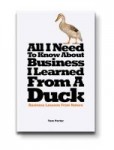With unemployment rates still in double digits, many individuals are thinking about becoming entrepreneurs. Over 6 million people in the US alone start businesses each year, yet up to 90% fail within five years. So how do you prepare for entrepreneurship? This is a key topic I deal with in my book, The Entrepreneur Equation (due out March 2011) and as a precursor, I thought it would be interesting to reach out to my respected network of entrepreneurs and business experts to find out their best tips and strategies that they would give to an aspiring entrepreneur so that they can better prepare to be a first time business owner (which are presented below in no particular order).
You may notice some similar themes, but I kept the insights separate, as something in the way one is framed may resonate differently with you.

1. Prepare and Expect Bumps
Do your research and talk to a lot of other entrepreneurs. They will have incredible advice and most are more than happy to share their successes and failures with other budding business owners. Also, create a business and marketing plan, but expect to revise it from time to time. You will encounter unexpected bumps along the way, but remember, you are not alone in this, and you can overcome them. Be flexible, be vigilant and be ready to succeed.

2. Know Who You Are & What You Do
The best piece of advice I can give to any new entrepreneur is to know who you are and what you do. Don't try to be everything to everyone, as you will end up being nothing to no one. Focus is the key. Have a clear idea of what your unique selling proposition is, your brand, your mission statement and the value that you bring to the table.
The better you understanding those things, the better you can develop marketing messages that can be understood & adopted by your early followers.

3. What's In a Name?
The name of your company should be well-thought out and considered in everything you will be doing from website design, letterhead, business cards and marketing brochures. Consider the sound of the name when you say it, the thoughts and feelings the name evokes and what impression it will leave when it is spoken and written. Your company name can make or break your business. Decide carefully!

4. Be a Giver
Don't let the fear of starting a business overwhelm you, and find a way to give to others rather than looking for what you can get in all of your dealings and interactions. It may seem like a cliché, but it does seem to be true that the more you give, the more you will receive. The only way to see if this is really true is to put it into practice and see if it is actually so. Our sense is that you will be amazed as to how your life will change and your business will grow if you do.

5. Jump into the Deep End
Whatever business you start, make sure you spend years in the same category. Children's clothing isn't about kiddie togs. It's about retailing. The ad industry isn't about ads; it's about the service business. A restaurant isn't about hosting a party every night; it's about managing razor-thin margins seven days a week. Unless you've been there, do not go there.

6. Go to School on Yourself.
Twenty years in the luxury hospitality sector and the first thing I realized was how unprepared I was to be an entrepreneur. I enrolled in an MBA Program at The University of GA. The program was one of the most demanding things I've ever done; the end result was amazing and significantly reduced my risk. From Finance to Entrepreneurship, the program provided extraordinary tools. The result - an extraordinary level of value added to clients that exceeds anything from my marketing background.
Thanks to: Robert Rippee of
FORMO.

7. Knowledge, Best Ammunition
Accept the fact that everyone is not a prospect for you. Know who your customers or clients will be, understand what makes them spend money (needs, problems, etc.) and determine how your products/services apply.

8. How to Find Down Payment Today
Banks aren't lending... especially on commercial. There is plenty of seller financing, but you still need that down payment.
Go to the suppliers of the business you want to purchase and ask them for a loan to make the purchase- seller finance the rest. Contract to continue using them as a supplier. Win- Win. And these days, companies hording cash have it for just such purposes.

9. Success = Sum of Small Efforts
Build your business every day, one step at a time and never give up. Remaining persistent, confident and diligent is the key to success. Beginnings are always difficult and there are many obstacles, but by taking every day's tasks one step at a time, you will succeed in your business adventure.
As Robert Collier said: "Success is the sum of small efforts, repeated day in and day out."

10. New Startup? Do Not Miss This!
Starting a business is exciting! Nothing is more noble than providing a living while bringing your unique gifts and talents to the market. There is ONE vital thing. Get this and your chance for success skyrockets, miss it and you will fail. What is it? Most businesses fail for lack of resources... estimate it will take 2x as long to get things done and your money will last 1/2 as long as you thought. This will create urgency and action. Nothing like a searing flame under you to get you in gear!

11. GPS Planning for Business
People always ask me what is the best way to start a business. It is full of lots of ifs, coulds and shoulds. The answer I give them is to think strategically, as in a strategic plan. What is a strategic plan? It is basically a map, much like a GPS device that lets you know where you are today and where you want to go. It lets you predict your cash flow and many other important items regarding starting a business. Don't be caught short, Plan!

12. Hardest Thing You'll Ever Love
Many people go into business thinking that they'll have complete control over their time, and as the famous book says, work a four hour week.
I'm here to tell you that you'll be out of business real quick if this is what you expect.
Starting a business means hard work and long hours. You need to commit to both if you want to make it.
My best advice -- choose something you really love doing if you want to create a successful business. You won't mind the long hours and hard work.

13. Team Work
The best tip I can provide is TEAM WORK. If you are in a relationship (i.e. married, partner, etc.) make sure your nucleus is on board. Being an entrepreneur can provide amazing benefits, however, not without a great investment of commitment. If you have a flat tire, your car will not go very far without further break down. Make sure everyone involved is as committed as you are and has enough air in their tires. This will assist in making the more difficult obstacles seem less strenuous.

14. Rally Some Advisors!!
You will most certainly need some help from others who have built successful businesses in the past, or others who are really good at what they do who can support you as you grow as an entrepreneur. Advisors to give you advice and guidance will be invaluable to growing your business because they have perspective that you otherwise wouldn't have until you've finally made the mistakes yourself. Learn from others and get great wisdom and guidance.

15. Sales is Everything
Sales is everything. My ONE best tip to any aspiring entrepreneur or business owner is to be prepared to sell. No Sales, No business! It's as simple as that. Never stop marketing for sales. Business is all about marketing. Don't get distracted with administration and production to the point of neglecting your sales because you will go backwards. Focus on marketing and sales. Focus, Focus, Focus- everything else will be added on to this.

16. Listen to YOU
There will be people who will tell you what to do or what not to do with your business. Listen to them, and if YOU think they make sense, do what they say. If it doesn't ring true in your gut, don't listen to them. Always listen to you. You have a stake in the business--so it will be YOU.

17. Be an Understudy
The ideal way to prepare yourself for being a business owner is to work for a successful entrepreneur and learn hands-on. I spent 10 years learning from such a mentor, which prepared me for all the challenges that come with starting and growing a business. I have subsequently started several businesses, and there hasn't been a day that goes by that I don't draw upon my previous experience. If you don't have that kind of time, at least work briefly for a company that you plan to compete with!

18. Define "Success"
My advice: establish your own definition for success. Know before you begin what you hope to accomplish and how owning and running a business will fit into your lifestyle. Are you starting a business out of passion, because you want to make money, or because you want to make a difference in your community? Understand very clearly what your goals are--after all, it's your company--and then build a company (and lifestyle) that helps achieve those goals. Do that, and you'll always be successful.

19. Be Prepared to Never Give Up
Every business owner will encounter problems and setbacks. History proves over and over that the main difference between a successful business owner and a non-successful one is that the successful one never gave up; so neither can you.

20. Plan for Success!
Too many entrepreneurs know what they will do when they fail, but few plan for success. Think of the new restaurant. The food is great, the service is wonderful and the prices are reasonable. The crowds come and the service gets slower. The food lacks its original zest and the prices zoom. Soon, the new restaurant with such great promise is another casualty of the failure to plan. You must consider what you can do with the time, resources and abilities that you have available to you.
Thanks to: Mitch Carnell of
SPWC.

21. Save a Brain Cell
The knowledge or research that makes your new product unique is what will also make you successful. Make sure you have a way to organize your knowledge so you can truly capitalize on this essential asset. This preparation will pay dividends when the chaos of a start-up means that your creative brain cells must timeshare with those that keep your business ticking-over.

22. Do You Have What it Takes?
Do you think being an entrepreneur is as easy as falling off a log? Guess again! While owning your own business does give you the freedom to go and come as you wish, it also ties you down for extended work hours.
Join networking groups where businesses can offer the financial services, marketing, etc., you will need in order to survive in your business. Never be too proud to let others know that you need help. This does not diminish your expertise in your field.

23. What's Your Why?
Take the time to determine that the reason you want to begin a new venture is something that you are in love with. You will be spending a great deal of time bringing your idea to fruition. Being deeply connected with your "why" will keep you motivated when the "shiny" has worn off and you are juggling the many tasks and responsibilities that come with being a business owner. The rewards are tremendous and worth taking the time up front to ground yourself!

24. Check Your Cash Flow
Though often ignored, the cash flow statement & projections in your business plan financials will alert you to any red flags regarding your cash position at different points in time - provided the statements are done honestly and conservatively. Have your accountant look at the projections. Don't neglect this, even if you aren't planning on borrowing money.

25. Entrepreneurship is NOT a Job
Entrepreneurship IS a lifestyle. I was told when I started my first business 43 years ago that now I no longer had to punch the time clock, except once - IN. I soon learned that my social circle began to revolve around other entrepreneurs. We had a lot in common, we always had something to talk about, and I always learned something new.
As you begin your first business venture, you should seek out other business owners and join their social circle. You will be glad you did!

26. Pretend You're a Squirrel
Squirrels collect and store nuts so they’ll have food throughout the winter. Those that do not store sufficient amounts risk losing their lives.
Most start-ups spend their seed money before cash has begun to flow at a positive rate, so squirrel away a minimum of 6-9 months of money sufficient to cover your personal living expenses, as well as your business overhead, or risk losing everything.
Who knows, preparing properly for the possibility of a long hard winter might be a lifesaver!

27. The More the Merrier
I am a strong believer in the value of finding mentors, master mind groups or coaching prior to launch and after. Ask successful people to mentor you and many will do it for coffee or lunch. If you can find a group of small business owners who discuss problems, successes and issues monthly, even better. The collective mind can decrease your learning curve and mistakes. Finally, if that doesn't work, find a business coach to keep you on track and doing revenue producing tasks.

28. Breakthroughs for Success
When things don’t work out as planned, don’t take it personally. Your ego keeps you in fear, making it personal. It has nothing to do with you. Acknowledge what is working well. Make a bold move. Be different. Playing it safe will keep you frozen exactly where you are now. By taking a leap of faith, you are creating an opportunity for you to do it differently than you had up until now. Successful entrepreneurs take risks, remain focused on the outcome and are willing to be trailblazers.

29. Run with FastTrac
The leg work is already done for you when you use resources from FastTrac, the program offered by the Kauffman Foundation. By using their website, you can find a low cost program that will have speakers, software, mentors, and research to help you get a real idea of the time and money needed to start your own business. It will tell you the truth, the whole truth, because Kauffman believes there are too many people out there losing everything they have for no reason.

30. Read Your Way to Success
My #1 strategy for an inspiring entrepreneur is to educate yourself on what it takes to be successful in business. The way to do this is to read “how to” books on business. Talk to any millionaire business person and you will learn that he/she owns many business books. And think of this; if you commit yourself to reading just 10 pages a day from business books, in a year, you will have read 3,650 pages! Think of the amazing business education you will give yourself by reading 10 pages a day.

31. Eenie Meenie - Who Will it be?
After being an entrepreneur many times over in the past fifty years, I can tell you unequivocally, the three people you should never enter into a partnership with are your friends, family, or neighbors.
Unfortunately, the three people we are most likely to enter into a partnership with are friends, family, and neighbors so, if you do, remember that business is business. Do it smart, have a contract and live by the contract.

32. Give Yourself Some Credit
A common challenge entrepreneurs face when launching a business is funding. And since most are underfunded (i.e., bootstrapped) at start-up, this requires some creativity and planning. Before leaving a full-time job to begin a new venture, consider applying for credit (e.g., home equity line, credit cards, etc.) while still appearing to be a good credit risk to lenders. After all, the best time to apply for a line of credit is before you really need it - especially in today's economic climate.

33. Self Evaluation
Self Evaluation: Are you ready to be an Entrepreneur?
Take the time and answer a few questions regarding your current idea. Do you know how to run your own business? Is there a market for your Product/Service? Do you know your competition? Are you willing to promote yourself at all times? Can you obtain funding/financing?
Have you asked yourself these questions before?
Are you surprised at any of your answers?
Anything you could be doing differently?
Thanks to: Bill Horton of
BizFix.

34. Network, Network, Network
Walk into a business networking event where you know no one. Work the room, introduce yourself and talk about your business idea. Not only will you get important and valuable feedback about the viability of your business idea, but you will gain experience in talking about your business and get prepared for selling your business concept to potential investors and clients.

35. Do Your Homework!
Before you start any new business venture, you need to do your homework. Make sure there’s a market for what you hope to offer and find out what prospects are willing to pay for it. Network, search the web, and make a few phone calls to both prospects and competitors to get a feel for the market. There’s no point in building a business around a discount “whatever” if nobody wants to buy it.

36. Entrepreneur Exit Strategy
Be sure to work out an exit point. E.g., if sales are not at $xx level by the 6 month point, I will try something else. Even if you don't know what the "something else" is now, have a time-line for changing direction. It might be a different direction in your existing project, or a switch to a whole new venture. Failure happens to all of us. Make sure your failures don't cost you too much. Pouring good money after bad is usually an observation made only after it is too late.

37. Entrepreneurial Success Tip
The most important thing an entrepreneur needs to do to succeed in business is to learn to prioritize. We can get sidetracked, other people push our buttons, and we often don't pay attention to what we should. If you take care of the A#1 priority, you will always be in charge.

38. Cards, Cards, Cards!
Carry and use your business cards at all times. Write names, addresses, directions and websites on them. Give friends and relatives your cards to distribute. Do not use tiny print unless you are selling magnifying glasses.

39. Get Your Money Straight
Have one year of your personal living expenses saved in the bank. Starting a business -any business- is stressful, albeit very rewarding. You don't need the extra stress of wondering how you are going to feed your family. This sort of desperation can lead to short cuts and bad decision making.

40. No Really Means "Not Now"
I am the Founder & CEO of a successful start-up and I have been hung up on, laughed at, and told no more times than "yes". The key is to not get discouraged and remember, No just means "Not Right Now". After all of the "no's", one of them contacted me after I sold out of my inventory in six months and asked to manufacture my product.

41. Size Matters -- Your Network!
Network relentlessly. Contact everyone you know -- even slightly -- and tell them what you are doing. No need to sell THEM, they now know; ask them for help to refer someone they know who might need your product or services. When you talk to that person, ask for that same information. Be prepared to tell "what you do." I'm not a believer in this "elevator speech" business, but you do need to be able to explain to someone what you do in short order. Say it quickly and then ask about THEM.

42. Talk Your Walk
Talk your walk & Walk your talk. Live it! From day one start gathering names and info of people who would be interested in your products. Your list is number one! Your idea may be great, but it's the people who will give you money that will make the difference if you fail or succeed. Talk to Rotary, the Chamber, where ever and who ever. Talk,Talk,Talk. Blog regularly and use the funnel system. Use inexpensive products to more expensive products, with each product leading to the other. Take baby steps each day.

43. What's the 'IT' of success?
Starting a successful business is about one simple action. And this simple action—if you take IT to heart—if you dedicate your life to IT—IT will not only ensure your success—it will make your dreams come true.
IT is something you can begin doing today.
You can do IT wherever you are.
You can do IT regardless of whatever else you may be doing.
What is the secret?
What is the action?
What is the IT?
Filling a Need is IT.
IT is about others.
IT is that simple.

44. Hang On Tight!
Being in business is similar to the front seat ride in a roller coaster - you need to not give up but instead, hang on tight knowing you will hit lows and highs at fast speed, learning all the while! Giving up, you will never know what you missed. Not giving up requires: continuing education, learning from errors, ignoring unkind remarks, knowing in your heart you can do it, transferring of belief to your conscious mind, seeking new venues to expand offerings and being proud of your accomplishments.

45. What's In a Name?
Would you rather buy from “Wicked Awesome Wallpaper,” or “Rick’s Wallpaper”? Your business name tells your market what you’re about and can set you apart instantly from your competition. It’s part of your brand. Don’t sell it short, and don’t be the Lone Ranger. Run a survey through social media and find out what names get the best responses, and why. You’ll know the right name when you smile every time you see it, speak it or hear it...and when others say, “Nice name.”

46. Money...Money...Money
Be sure that you have saved enough money so that you can survive for at least 6 months when you first start your new business. What you will need to put out will be much higher than what you will bring in at first - be prepared for that because it's not easy when you are trying to build your business.

47. Interested or Committed?
As a serial entrepreneur/solopreneur, whose current company is over 17 years old, the single biggest tip I can offer to an aspiring entrepreneur is that there's a BIG difference between being "interested" in something versus being "committed" to something.
When you are merely INTERESTED in something, you'll do whatever is convenient for you. When you are COMMITTED to something, you'll do whatever it takes! I must give credit for this saying to my good friend John Assaraf.

48. The Most Important Question...
Many young entrepreneurs mistakenly choose the business they will pursue by how much money they can make, or by what is currently popular. Instead, build a business in an industry that you are passionate about. Ask yourself, "What can I do to improve the product, the delivery of service, or the consumer experience?" When you devise a better product, or a better way to do things in an industry that you already enjoy, you stand a greater chance of creating massive success.
Thanks to: Steve Gallegos of
WhoYa.

49. The Power of Free
One of the best pieces of advice I received when I was first starting my business 9 years ago was to be prepared to work for free. Since clients don't know your brand, you need to give them something of value to reverse the risk of working with you. Make something useful and give it to lots of people - like a sample in the grocery store - when they come back for something custom, that is when you can charge them. I've made thousands of contacts around the world giving away useful advice.

50. How to Know Your Prospect
Knowing your Perfect Prospect is critical to the success of any business because marketing is basically a conversation--you, the business owner, trying to communicate to a listener, your Perfect Prospect. Once you know who you are and who your Perfect Prospect is, you can discover exactly how to frame your promotions to the best advantage. No matter what your product or service, now you can talk about your benefits in terms that will cause them to look up and pay attention.

51. Are Questions Key to Success?
When everything we thought was true about business no longer is, the best thing a new entrepreneur can do to stay on the leading edge of these changes is to ask questions.
When we decide we have “the answer” to a business problem, we don't notice any other possibilities— which could be more profitable.
If what we thought we knew is just an interesting point of view, we can ask questions like “What else is possible?" or "How does it get even better than this?"

52. My Wise Mother-in-law's Advice
At the tender age of 26, after reading Bon Appetit for several years, I got fired and decided to follow my dream . . . and buy a restaurant.
We were in the car--George driving, me shotgun, his parents behind us--when I shared the news. And George's mother (a wise, wise, wise woman) responded, "If I wanted to own a restaurant, I think I'd go work in one first and see if I liked it."
Wise woman.
Oh, how I wish I had taken her advice.
In subsequent adventures I have--gratefully.

53. Entrepreneurs are Visionaries
Walt Disney said, “The way to get started is to stop talking and start doing.”
Entrepreneurs are risk takers and wealth generators. They are people with a strong desire to create their own success. Today's top entrepreneurs seek out and practice the skills they need to succeed. In short, entrepreneurs do what they have to do - to get to where they want to be. Remarkable success is limited to those who not only see opportunity, but also seize it!

54. Begin with the End in Mind
From your first thought about opening your own business, you are not thinking about how to run it as much as you are how to SELL it. The ONLY reason to start a business is to sell it. If you begin with that reality in mind, you will avoid the idea that you are creating a job for yourself and focus on creating a true asset. You do not have to sell it, but if you are always ready to sell it, you achieve the financial and emotional freedom that every true entrepreneur seeks. It is The Objective!

55. Don't Quit Your Day Job
Start your business on a part-time basis while you are still working full-time. Treat your full-time job as a "funding source" for your business start-up. You must take daily concrete action steps to get through the start-up phase and once the business is up and running, you must do at least one thing every single day to market your business. Bonus: viewing your job as a funding source will give you the strength and good humor to deal with Corporate America madness until you can resign.

56. Wishers or Washers?
Only 5% of the population achieves unusual levels of success. They are the doers, the movers and shakers, the ones who are clear about their purposes and set out to make a difference, no matter what challenges arise. These people are Washers who:
o Wash away problems,
o Forge new roads of discovery and possibility,
o Breed new life and potential.
Washers may not always succeed on the first try – or the second or the seventieth – but they keep on keeping on until they reach their goals.

57. Run with Another's Vision
A good strategy for an aspiring entrepreneur is to work for one. It may seem contradictory to set your vision aside to run with another; however, if you help someone else reach their vision, then it will give you the skills to help you reach yours.
You can observe the stresses and the joys of owning your own business by taking ownership (working it as you would your own, following directions and the heart of the owner).
This gives you the best feel for running your own business.

58. Chief Cook & Bottle Washer!!!
If you are considering business entrepreneurship, before you take the plunge, there are many preparations to be made and a few things to consider first. My best advice would be:
Plan to invest a huge amount of your time into running your business. Unless you’re working with a large budget and can afford to hire someone to manage your business for you, you should prepare to spend the majority of your time running the business yourself.

59. Personal Risk Assessment
There is inherent risk in private business ownership. The degree of risk will vary based upon the entrepreneur's skills and experience, the financial capital available for investment, and the type of business being pursued. The entrepreneur's risk tolerance should be thoroughly assessed when evaluating business opportunities. There is a greater degree of risk in starting a business from scratch than buying a brand name franchise or acquiring an established business with a history of earnings.

60. Embrace Uncertainty
To nurture the entrepreneurial spirit, feeling the fear and doing it anyway, is part of the process. Persistence and hard work pay high dividends. Don't ever give up. Take good care of yourself, and you'll have the emotional and physical stamina to see you through even the rough spots.

61. Jump in With Both Feet
It's usually quite hard to make the leap of faith that starting a business takes. Whether you have an existing job, hobbies, or a fear of financial ruin, starting a business inevitably means going all in. So if you have the idea, the means, and the inclination - just go for it. Quit the day job. Stop playing pick-up hockey. Make absolutely sure you give your new business the most that you can give. The only thing worse than failure is always wondering what could have been.

62. Harness the Power of Focus
Focus is Power! In order to be successful, you must find the thing that you are the best at and focus all of your energy on mastering it. Don’t allow distraction and multi-tasking to rule your business. Concentrate and focus all of your attention on one thing at a time until completion.
Make sure you are moving in the right direction towards reaching your goal by putting more focus and attention into what you do every day. Stay in control of your actions and keep away from any counterproductive task.

63. Learn From the BEST
Take at least one course or training program on entrepreneurship from someone who's already been there and done that.
BE CAREFUL ABOUT TAKING ENTREPRENEURSHIP COURSES IN COLLEGE. Most entrepreneurship courses in college are taught by college professors who have NEVER started a business.
Choose a program taught by entrepreneurs for entrepreneurs.
Besides this, go to a public library and learn sales, financial statements, organizing and people skills.

64. What You Don't Know WILL hurt
The real key is having a solid understanding of the industry structure and the market. Knowing how things work and how things get done in a particular industry gives an entrepreneur a leg up. Knowing with what and whom you compete are essential. Never believe you have no competition, or worse, assume your competitors are stupid. They figured out how to get there in a market that perhaps you haven't yet.

65. Do Your Research!
It's boring, but no one should jump into business without first learning about what it takes to run one. Sure, the owner knows how to make a great widget, but business is much more than delivering a product or service. Even if he hires people to help, he needs to know about marketing, accounting, legal issues, business management, etc. Lack of knowledge is a sure way to miss something important during the planning stage and can lead to business failure.

66. Know Why They Buy!!
Discover the reasons that people may or may not buy what a business owner has to offer. Research like this is critical to business success.
The ability to strategically build your business based on REAL customer wants, needs and problems significantly shortens development time and effort.
Key phrase, "Nobody ever went broke supplying what the customer was willing to pay for!"

67. Mentally "Ripped" for Business
The biggest preparation is mental. You've got be like a weight lifter, strong and ready for the ups and downs of entrepreneurship. However, here's the number one thing to prepare for:
Client acquisition - how and where will you get your clients and sell your product/service? Without sales, your business will go nowhere. As Ford would say: that's job #1 - Sell, sell, sell!

68. Start BIG-- Be an Inventor
As the daughter of a prolific inventor, I was encouraged to see the world through an inventor’s eyes. Inventors see every opportunity as novel. They maintain an open and curious mindset that enables them to see beyond what is known. Starting a new business, you must always see beyond what is known because everything you will do is new to you! Be true to an inventor’s mindset- skip over the boundaries other people will try to set for you and think BIG.

69. Be Willing to Seek Guidance
Don't be shy about asking for guidance from other business owners; most are happy to answer questions and share their experience and opinions. If you have the budget, you can bring in another business owner as a consultant. You could pay a one-time consulting fee or pay them by the hour to help with your business plan, or to oversee the business in the first month of operations. A board of advisors is another great option to consider. If money's tight, consider a trade of your services.

70. A Journey of a Lifetime
Having worked independently for most of my life, the best advice is to be fully prepared.
Meaning, do your research, discover your strengths and weakness, explore your industry, competitors and look at trends, and speak to everyone. Never be frightened by fear or rejection; it's part of the process and you will naturally overcome your fear by being prepared. That will make you "special and unique" and that will give your business immediate authority. Enjoy the journey!

71. Plan Your Way to Success
One of the top reasons new businesses fail is not having a plan. Before starting a business, understand exactly what your business is, where you want it to go, and what roadmap you have in place to get there. A great way to develop a plan is to talk to people already successful at doing what you want to do. Find those people and copy them. This will help you know what steps to take and what steps to avoid. Look online for free business plan templates. Be sure your plan is realistic.

72. Starry Eyed Entrepreneur Crash
"Yes, I am going to start up a new business! I have my plan in place and my vision is grand!" "By the way, what experience do you have in this industry?"
"Well, I use their services all the time, I've done a few things myself and believe I can do better." This was an exact conversation with a young man thinking about opening a sports bar. "Why don't you go bar tend and work at one first for a few months?" Six months later, he said "I hate that business, the hours and the stupid people!" Lesson learned in time!

73. Speak Your Best Asset....
Every time you speak about your business, it is an opportunity to increase your recognition and income! To develop a fabulous description of what you do, think about what makes you different. You may be the lawyer with integrity or maybe your bath product is the best because it is your grandmother's formula. There is something about you that the world will be better off to know, and no one can benefit if you cannot deliver your message effectively.

74. Time Management is Key
Get your channel surfing under control now! When starting your new business, you will need to wear many, if not all, of the hats. So determine where you're wasting time, start creating a schedule, and stick to it! Then, when you start your business, managing your time will already be a habit.

75. Just DO It!
There's no such thing as the 'right time' so stop waiting & start working! You need to start, test, fail, make changes, fail again & repeat the testing & making changes consistently until you make it happen. No books, blogs, & education will ever prepare you as much as the first step & first failure in your own start-up would do. So, do not wait another day on preparing yourself to start; just start!
Remember, you can always make changes & change directions to make it a success!

76. Focus! Focus! Focus!
I suggest that new business owners stay focused on their core competency and offering. There is a tendency to want to be all things to all customers, which ultimately keeps you from being the best at one or two core offerings. You need to stand out. Business owners stray from their focus because they want to please and because the money is tempting. Your business will grow much more quickly if you stay focused!

77. Secret Agent of Truth & Style
Plan to be successful, but open to the winding road of growth. No matter what's in front of or around you, view it from 10,000 ft and hold your center of integrity tight. This insures, no matter the size of your bank account, your success and wealth in why you are here: to learn, teach and make a difference.

78. Ideas Before You Start
a) Like people.
b) Stay constant and honest despite any business ups and downs.
c) Be willing to listen to feedback and keep learning and growing. You don't know it all.
d) Be willing to make sacrifices.

79. Know Your Numbers!
The best advice I could give a new entrepreneur is to get a firm grasp of "the numbers" by building a business scorecard that tracks the items directly affecting the health of your business and the progress you're making toward your business plan goals. For instance, how many transactions and at what price do you need to break even or to hit your projected financial targets? If you can measure it, measure it... and then manage to your metrics. It's helped us grow from 2 employees to 1,000+.

80. But Will it Work?
Get over the fear of failure that is holding you back. You have an idea; chances are, someone already thought of it, or something similar. This is good. It gives you a chance to look up their information and see if “it worked”. This research not only helps you get over the fear and gain confidence to move forward, but it also gives you insight into what they did right and wrong so that you can learn from it. Investors will also need to know “Will it work?” in order to fund your business.

81. Start in the Black from Day 1
Do everything you can to avoid fixed costs, capital and other recurring costs until you know that you have a profitable concept. Our company started with just 25 products that we knew we could sell for a profit. We learned a lot from that initial test and we made tons of tweaks to our business model.
Banks love us because we have a track record of profitability and now we know how to run the business without a lot of capital.

82. Customers are Not Things!
Customers are not "things" you pitch. They are prospective-loyalist you benefit! Entrepreneurs need to check their mindset at the front door before they plan to put a key in it. Circumventing business failure is simple with knowhow, common sense and the right mindset!

83. Wash Dishes
I HIGHLY RECOMMEND that you get used to washing dishes...YES, literally! No dishwasher short cuts, no hiring a maid...Don't even make your kids do it! YOU, the aspiring entrepreneur, need to get your hands dirty & wash those filthy, dirty dishes that have been sitting in your sink for over a week. Here's why:
Washing dishes is symbolic of Servanthood & the Act of Serving. Master the art of being a servant & you master the Art of being an Entrepreneur!
Washing Dishes = Service = Entrepreneurship

84. Your Image: Asset or Liability
Some entrepreneurs use conventional 'Dress for Success' wisdom in addressing their Image - if they are even aware of it. Entrepreneurs are the public face of their company and have a responsibility to be true to themselves and to the personality of their business. A typical business suit may not convey their fire, intelligence and passion, or speak to their target market. You can design your Image to harmonize with the business and give a vibrant impression that will attract more clients.

85. Avoid "Shiny Object" Syndrome
There are so many distractions & directions that your attention can go in when starting your own business, and we must wear many hats in the beginning. But trying to do a little of everything keeps you going in circles & making little forward progress.
Focusing on the tasks that bring money in first is my most valuable tip. After that, try to tackle one task at a time. Believe me, it's not easy to do! But if you can do that, you are way ahead of the game.

86. Life Plan Before Business Plan
Would-be entrepreneurs need to make sure that they know what they want out of life and then build a business around that. They need a life plan before they ever write a business plan. First-time entrepreneurs should make sure they start a business that is a good venture for them and their families. The first question they should ask themselves is, "How much money do I need to make to be happy?"

87. I Can't Do it Without Them!
The best thing I did to prepare myself for entrepreneurship was to register with my local SBA office to take their prep courses BEFORE starting my own business. I took ALL of the courses they offered and set up an interview with my local SCORE office for mentorship as well. The support from the counselors has been tremendous and now, I have real people I can reach out to when I get stuck, who have more expertise in running a business and who are available to talk to me.

88. Get a Record
Entrepreneurs with track records attract capital with much greater ease than those with none. So if you can, get a job in your chosen field and amass a track record before striking out on your own. Great ideas are a dime a dozen. Experienced management teams are rare. Backers fund successful managers over great ideas. In the end, the best track record wins backing. And businesses are built on access to capital, as well as hard work and brains.

89. Better Speakers Build Business
Build on or dust off your business communications skills, while getting to know new potential clients. How? Join a local Toastmasters group that your targeted clients or new industry contacts may be members of. Why? For beginners or those needing to dust off their skills, Toastmasters is an effective way to become a better communicator and meet like-minded people. Already a great speaker? Look for a reputable Speakers Bureau or get involved with the National Speakers Association.

90. A Check Up From the Neck Up
Becoming an entrepreneur is a life changing event. Often the focus is on the 'what' i.e. your business skills as a plumber, architect or designer, but the inner game is overlooked. Preparation for the reality of going it alone requires a check up from the neck up. Can you envisage yourself being successful, and importantly, what is your relationship with money? Without the inner conditions for success, the entrepreneur is doomed to fail, regardless of the skills they bring to the market

91. Get Comfortable in Elevators!
Business owners need to be able to describe their businesses quickly, clearly, and passionately. By having an elevator pitch, you can ensure that you're ready to present your business to customers, press sources, and other businesses. Many people have great difficulty describing what their business does. By practicing your pitch before friends who don't know much about your business, you can tweak your pitch until it's perfect.

92. Know What You Know
Take as many assessments and tests as possible to learn what you are good at and enjoy. If you have aptitude and interest, you will go far. If not, you can hire someone to do what you are not good at.

93. Begin with Your Exit Strategy
An exit strategy is not a matter of "if", it's a matter of "when" and "how", so getting it right at the onset will be vital to your success. The simple step of ensuring that you and your co-founder and partners are in sync is important. For example, if your partner intends to grow old with the business, but your plan is to be on a beach in Tahiti in five years, you have an issue right there. Once you have your exit strategy, you can structure your business to meet this plan.

94. Spend Wisely, Grasshopper...
The best advice I can provide, especially given the rough economic times of late, is with respect to money management.
Always run your business financially like the economy sucks. Don't overspend, don't buy things you don't need, and don't invest in any activity that you cannot see a clear business benefit from. End of story.

95. Perseverance
As a mom of four and business owner, I speak from experience. A successful entrepreneur is completely determined, focused, and passionate about their business. More than money and a business degree, if you are 100% devoted to being successful, you will be. There will always be people who say you can't do it and daily obstacles that will be thrown your way. It will not be your business savvy that gets you through, but your perseverance. That drive will define you and eventually inspire others.

96. I Call it the Reality Scenario
People often show me their best, expected and worst case scenario and ask for my input. It's always the same. Take your worst case scenario and half it. I call this the reality scenario. If you can survive it financially, you are probably good to go.

97. Inn the Know
Inn-keeping is one of the most enviable vocations around and yet burnout is typically around five years. We highly recommend to "wannabes" that they stay at a dozen inns in the year before getting serious about this endeavor and ask innkeeper-owners "If you knew then (when starting out) what you know now....?" Compile your collection of answers and see if there is a common thread. This practice should be applied to any type of business, but please don't expect to interview owners without giving them your business or paying them for their time.

98. Decisions Decisions Decisions
Whether it's a decision of what to focus on in the business, how to reinvest your profits or anything in between...listen to the ideas of as many as possible before deciding. Call on as many professionals, locals, prospective customers, employees and objective sources as feasible, and then add your own personal research and experience before making any large decisions.

99. Join a Nonprofit Board
Here's a simple, cost-free strategy - join a nonprofit's board of directors. You'll get to demonstrate whatever it is that you do well to executive decision makers, since boards typically consist of a variety of professionals. This can help in building your own brand and potentially, business from new clients. Plus, you'll get management experience from running a business on a budget, with collaboration from other pros. The satisfaction of giving back to your own community is another bonus.

100. Networking Business Tip
For an up and coming entrepreneur, I would advise attending business-to-business networking functions and having a compact portfolio with you. Continue to bring business cards, but the portfolio gives you an "edge" when you show proof of the particular certifications/licenses you have earned. You'll be on the minds of those who attended previous networking events more so. Get to a networking event early; prepare to stay late. Research what you learned so you'll be prepared if the topic resurfaces.

101. Confidence Why?
The math is simple really, confidence + action = success; when you have confidence in you and what you are doing, it shows and others can't help but believe in you also. Yet, take the same person, same idea but no confidence and they will fail, because people can tell when there is no confidence.

102. Know Your Customer!
For someone starting a new business, THE most important thing is to know your customer --- the more specifically, the better. Management guru Peter Drucker once observed that a business exists to create a customer. All of a new business’s key decisions --- from what to name and where to locate it, from where to advertise and what message to use --- should be guided by the customer. Without this understanding of the customer, the new business is likely to waste a lot of scarce time and money.

103. Startup Success Secret
The secret to success is being a robotic-like perfected version of yourself. Humans make mistakes, but creating and documenting a system for how you uniquely offer services will ensure success. Create the process, implement it, tweak and repeat.
When you design a process that you can duplicate, you make it easy to hire someone who can do it "just like you." This will allow you to step back and work on tweaking your strategy (while work is getting done). That is when you are "in" business.

104. Do What You Love!
Choose a business that you love. It's extremely hard for a first-time owner, so expect many bumpy roads and pitfalls. If you have passion for what you do, you will power through the bad times and travel on to better days. Just like a marriage, if money, superficial reasons or false pretenses are what's driving you, forget it; love is the only thing that will make it last.

105. Become a Student
Passion is definitely a key asset in beginning any business enterprise. But just as important is taking the time to become an expert in what it is you want to do and taking the time to study and understand your market. To not do your due diligence is at best, lazy and at worst, setting yourself up for failure. But the mere act of doing your homework puts you at a tremendous advantage when starting a new venture and further ensures the chances that you will in fact succeed!

106. Fail Fast. Fail Often.
Learn to fail fast and fail often. Get your head around the fact that failure is OK in entrepreneurship. The faster you fail, the faster you get to be a prepared entrepreneur.
Fail more often and you become a smarter entrepreneur. Knowing what you don't know is expected. Don't guess and have relationships with those who have been there.

107. Cover your Backside!
It’s easy to be overly optimistic about how quickly your new venture will become a success. Be cautious. Start the business part-time, work a second job, have a large cash fund, and/or make sure your spouse can provide for the basic needs of your household. Break-even often takes three times longer than you anticipate. Avoid borrowing money. It's bad enough to lose your own savings. It's worse for your business to fail and have a huge debt (worse still if you borrowed from family or friends)!

108. Mastermind Your Way to Success
Creating a mastermind team is a lot like having your own Board of Directors. It's the fastest way to accelerate your company's success. Through regular contact, each member is able to tap into significant thought leadership and insights that can help uncover hidden potential, boost sales or warn you of pitfalls in the business. But don't wait until your numbers are lagging to assemble your team. Just do it...now!

109. A Laser-Focused Business
A successful Entrepreneur is crystal-clear on the Blueprint for their business. You have to know the Purpose of why you are in business, and what customers may be missing if you were not in business. It is critical to know the Principles that guide the direction of your company, because these will assist you in making effective decisions. Next, you need a Picture of the ideal future state of your business, and a clear action Plan of the Priorities that are necessary to achieve this state.

110. Sacrifice for Success
Our company has experienced modest growth during one of the worst economies we’ve seen in decades. This is a result of sacrifice. Cut expenses. No vacations. Budget. We’ve devoted all of our time to this fledgling business to come close to achieving some level of success. It takes so much hard work and total, focused determination. We have dedicated our physical, mental, and financial resources to see this project through. Success is achievable if failure is not an option.

111. Systems are Key!
One key to success is to build systems. When you create systems around your business, you not only increase effectiveness and efficiency, you create a business that can run when you are not there. When you have solid systems, others can assume responsibility for certain functions. The best part? When you have systems, you increase the financial value and resilience of your business.

112. If No One Knows About You...
...You're Out Of Business! Be prepared to be an innovative marketer. Don't just buy or do traditional marketing - think of ways that will really get your target market's attention & make a splash or hold a fun event now and then, keeping your integrity. It doesn't have to cost a lot of money. But be prepared to build your relationships & sell your products/services with exceptional customer service - go the extra mile! Give & you'll get back. People enjoy fun & excitement, & trust expertise.

113. Embrace the Journey!
It is important for entrepreneurs to have a plan and focus on the future, but it is equally important to live in the present. Living in the present enables you to embrace the journey. Look at what you have learned. Look at what you have accomplished- even the baby steps. Celebrate it! Your journey is priceless. If you constantly look ahead, you will miss the rewards of your hard work. That reward is in the here and now. Also, don't overlook the lessons of today. Be still and absorb TODAY.

114. 1st Impression, What's Yours?
It takes 5 seconds for people to form an opinion about you. As an entrepreneur, how you present yourself is the first step in introducing your business to potential clients and the first step in building business relationships. So, get your impression right the first time.
Be on time. Dress appropriately. Have a firm handshake. Use proper dining manners. Master the art of small talk.
These behaviors make a great first impression. Do them and you will out shine your competition.

115. No Man is an Island
Stepping into the journey of becoming an entrepreneur is amazing, however, keep in mind you don't want to do it alone. You need to build yourself a support system. A support system may consist of the following: business coach, mastermind group, virtual assistant (to delegate to), close one-on-one accountability and more.
The key is to develop a team that can support, encourage and even guide you into success. We cannot do it alone if we want success.

116. Two the Hard Way
The best way aspiring entrepreneurs can prepare to be first-time business owners:
1. Speak with several people who have succeeded.
2. Speak with more people who have failed.

117. Heart = Success!
You don't need money to start a business, you need heart. If you are thinking of starting your own business, congratulations! You will discover along the way that nothing will bring you more self confidence, gratification, or financial gain than being your own boss. Anyone can hand you a check for $500,000 to start your own endeavor, but if you don't have the fire, the passion, and the heart, as well as the business idea, you might as well throw that check right into a burning fire.

118. Plan How to Find Customers!
Plan as hard for how you will find customers as you do to open the business. Too often business owners will invest everything in their storefront & inventory, or beautiful offices, and when it's time to find customers they have no money left. They think, "If I open it, they will come." Not true. Remember to use your strengths and hire your weaknesses. This isn't the time to wing it! A marketing plan, complete with a detailed target market and promotion plan, will make or break a new business.
Do you have another idea that wasn’t included? If so, please share it below.



















































































































